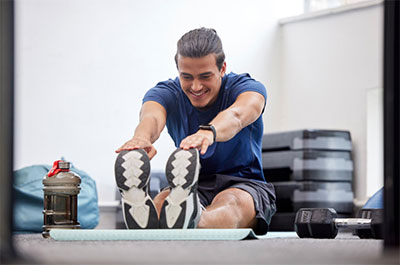
The knee is one of the largest and most complex joints in the human body. Due to the combination of its complex nature and the stress that sports place on the knee, injuries are quite common. In fact, knee injuries account for 55 percent of all sports-related injuries1. Since knee injuries are so prevalent, it's critical that you take steps to prevent them. Here are a few things you can do to avoid a knee injury:
- Strength train- Incorporate strength training as part of your exercise regimen. Stronger leg muscles will provide better stability to the knee joint.
- Warm-up and stretch- cold muscles are much more susceptible to injury. Warming up before you exercise promotes blood flow to your muscles.
- Perform exercises with proper form- When you are strength training or stretching make sure you use proper technique.
- Rest/refrain from overtraining- Your muscles need rest and recovery. More is not always better. Give your muscles adequate rest between workouts.
- Wear proper-fitting shoes- Choose shoes that provide good stability and are specific to your sport or exercise routine.
- Eat a well-balanced diet- Consume a diet that is nutrient-dense and supplies your body with sufficient protein in order to build and maintain muscle. Drink plenty of water so you will stay hydrated. Dehydrated muscles are more prone to injury.
- Make modifications- If an activity or exercise causes you discomfort, make modifications to ensure your knees are safe.
Most athletic programs place a major focus on injury prevention. An athlete who is sidelined due to an injury is a detriment to the team. Despite all the efforts taken to prevent knee injuries, they still occur. If you or your athlete has experienced a knee injury there are a few treatment options you can try before consulting with an orthopedic specialist.
RICE- Rest, Ice, Compression, Elevation. The RICE method has been around for many years. It is a great first step to take with any injury that is not severe enough to be seen by a physician immediately. Take a few days off and see if rest provides you with relief. Ice intermittently for 20 minutes around four times throughout the day. Apply a compression bandage or wrap to the knee area to help reduce swelling. Elevate your knee above your heart by propping it up with pillows or blankets.
Over-the-counter medications- Take NSAIDs (non-steroidal anti-inflammatory drugs) like ibuprofen, Tylenol, or naproxen.
Knee Brace- A knee brace can be helpful by providing stability and proper alignment for your knee. Your physician will recommend an appropriate brace based on your needs.
Physical therapy- If your knee pain is not subsiding with at-home remedies your doctor may recommend physical therapy. Your physical therapist will give you exercises to do at home regularly.
Knee surgery- If you have been seen by an orthopedic specialist and non-surgical treatments have not provided you with relief, your doctor will likely recommend surgery. After a thorough evaluation to determine the type of knee injury you have, your doctor will create a surgical plan.
While preventing sports-related knee injuries is the goal, some injuries still occur. If you have knee pain or swelling that persists despite at-home remedies, contact Dr. Ramesh Chandra at the Center for Orthopaedics and Sports Medicine and schedule an appointment today!
Dr. Ramesh Chandra has been practicing orthopaedic surgery in the Washington DC Metropolitan area since 1984. The Center for Orthopaedics and Sports Medicine is easily accessed from anywhere in the Washington DC metropolitan area, with offices located in Falls Church, Reston/Herndon, and Tysons Corner.












